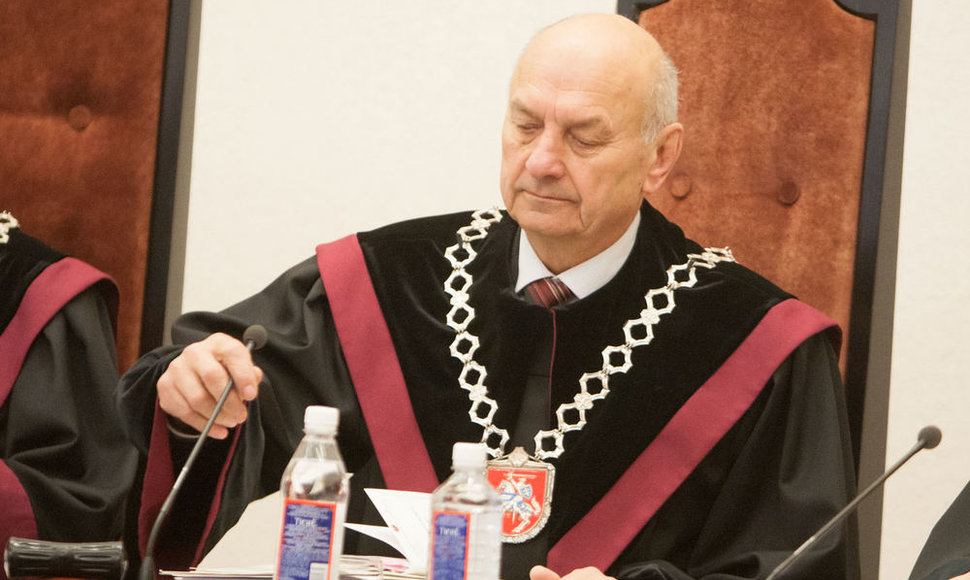"In the Constitutional Court's view, the scope of the violations of the Law on Elections to the Seimas was not big enough to have a major effect upon establishment of the number of mandates for candidate lists," the court said in a press release.
"Under the Law on Elections to the Seimas, the Constitutional Court's ruling does not provide legal reasons for the Seimas to invalidate the results of the elections in multi-mandate voting," the court said.
According to the conclusion, the Lithuanian Central Electoral Commission's decision as to the line-up of the Labour Party's candidates ran counter to the law, however, the number of mandates in multi-mandate voting was correct.
The court also found violations in Biržai–Kupiškis single-mandate area, and the parliament will probably have to announce repeated voting there. Aleksandras Želtinis of the Social Democratic Party has won a seat there.
According to the finding, the Central Electoral Commission failed to take consideration of the available information about mass vote buying for some candidates when approving the final line-up of the Labour Party and establishing the individuals who won parliamentary mandates.
"To the extent the 4 November decision of the Central Electoral Commission establishing that Jolanta Gaudutienė, Jonas Pinskus, and Živilė Pinskuvienė were elected in multi-mandate voting via the Labour Party list violated Article 90 of Part 1 of Article 5 of the Law on Elections to the Seimas," said Urbaitis.
After exclusion of the candidates from the Labour Party's list, the party's candidates Vilija Filipovičienė, Gediminas Jakavonis, and Larisa Dmitrijeva may rise up the list to qualify for a seat.
Presidential adviser Indrė Pukanasytė, who represented the head-of-state at the court hearing, said: "The president does not provide comments on the finding of the Constitutional Court."
"As now the Constitution and the Law on the Elections to the Seimas requires that the Seimas makes a decision, the president will make her decisions and make them public in the beginning of next week," the adviser said.
Zenonas Vaigauskas, chairman of the Central Electoral Commission, said that the Constitutional Court's ruling was unexpected but valuable.
"The Constitutional Court's finding was somewhat unexpected, it summarizes the experience of elections in general, it is very valuable as the essence of the Constitutional Court's ruling is that candidate lists in multi-mandate area are unquestionable, this is what we emphasised the most (…) and the inquiry from the Seimas and the president was about this. Nevertheless, the Constitutional Court raised an entirely different aspect that was not discussed and that, to my understanding, is not defined clearly enough in the election law – the candidates who violated the law should be excluded form the multi-mandate candidate list and be given no mandates for rating points. These are the candidates of the Labour Party, and this is the proposal of the Constitutional Court," Vaigauskas told BNS on Saturday.
In his words, relevant decisions are now expected from the Seimas – i.e., the elections in Biržai–Kupiškis constituency were invalidated, a decision should also be made in connection to the line-up of the Labour Party's candidate list.
"This is to be decided by parliament, but the most likely decision is that the elections in Biržai–Kupiškis haven't taken place and there is no elected MP. (…) It is my proposal that the Labour Party's candidates referred to in the Constitutional Court's finding should be excluded from the candidate list and receive no mandates, so their places should be taken by other candidates on the Labour Party's list who have received fewer rating points," Vaigauskas added.
He acknowledged that the electoral commission did not do a good job in some cases but said he was not considering resignation.
Gintaras Songaila, leader of the National Union, said he would register a draft resolution at parliament on Monday, proposing that parliament should pass a decision based on the Constitutional Court's ruling.
In Songaila's words, the finding should lead to “automatic” termination of the Central Electoral Commission's mandate. Nevertheless, Vytenis Andriukaitis of the Social Democratic Party said it was merely Songaila's personal opinion.
In Andriukaitis' words, final decisions and the electoral body's mandate is an issue to be decided by parliament, and the decisions "may be very different."












